SSH Compatible VPNs: Boost Your Online Security In 2025
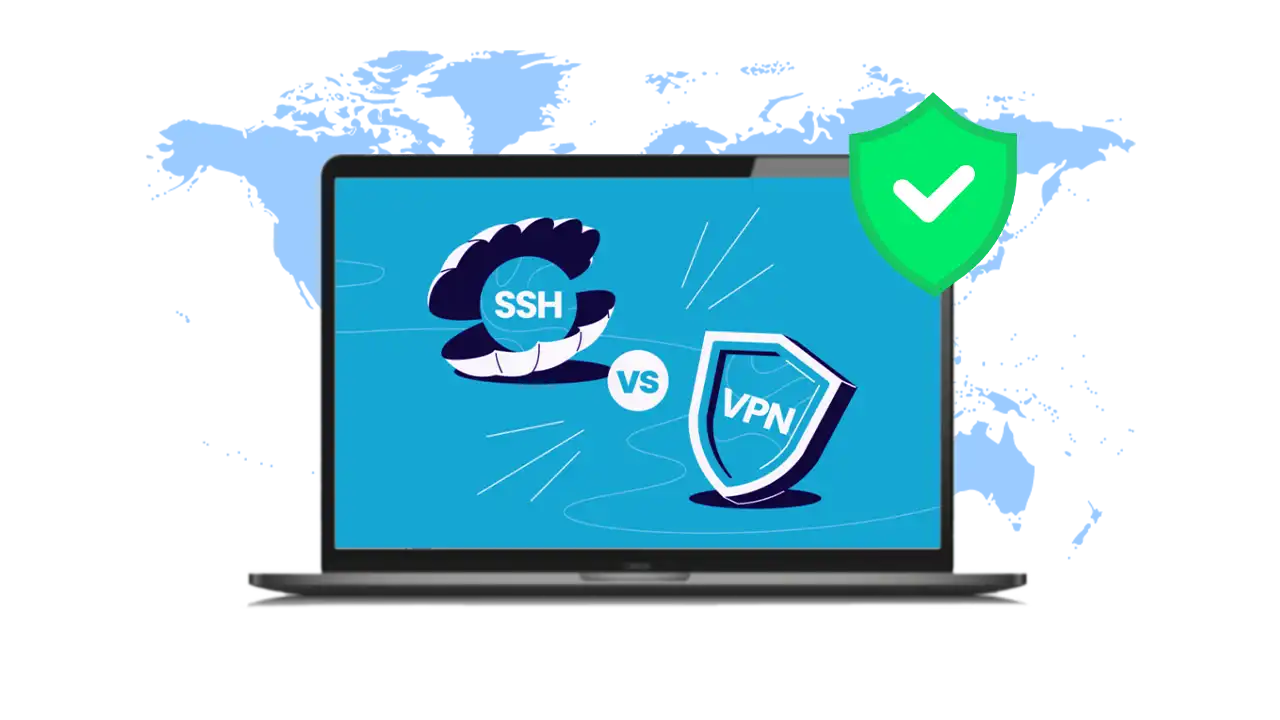
In today’s digital era protecting our online privacy and securing our data is more important than ever before. That is where SSH comes in. It is like the superheroes of the virtual world swooping in to keep your information safe and secure from spying eyes and cyber villains too.
We will dive into the exciting world of secure socket shells and virtual private networks to explore how they work together to create a fortress of security around your online activities. So hold your horses, get comfy and let’s go ahead on this tour to discover the power of SSH compatible VPNs.
What is SSH Protocol?
It is a cryptographic network protocol that enables secure remote login, command execution and data transfer between two devices that are connected online. It gives you a stable channel even if the network is not secured. It also makes sures that all communication between you and the server remains encrypted and always protected from people who are not authorized.

Get Started w/ NordVPN Today
- Top-rated VPN for OS unknown
- Ultra-fast speed in 2025
- Save 69% off with VPN.com Discount
- Plans starting at $2.99/month
- Rated 4.5/5 on Google Play with over 825,000 reviews
- Rated 4.7/5 on Apple App Store from 6,600 users
How Does Secure Socket Shells Work?
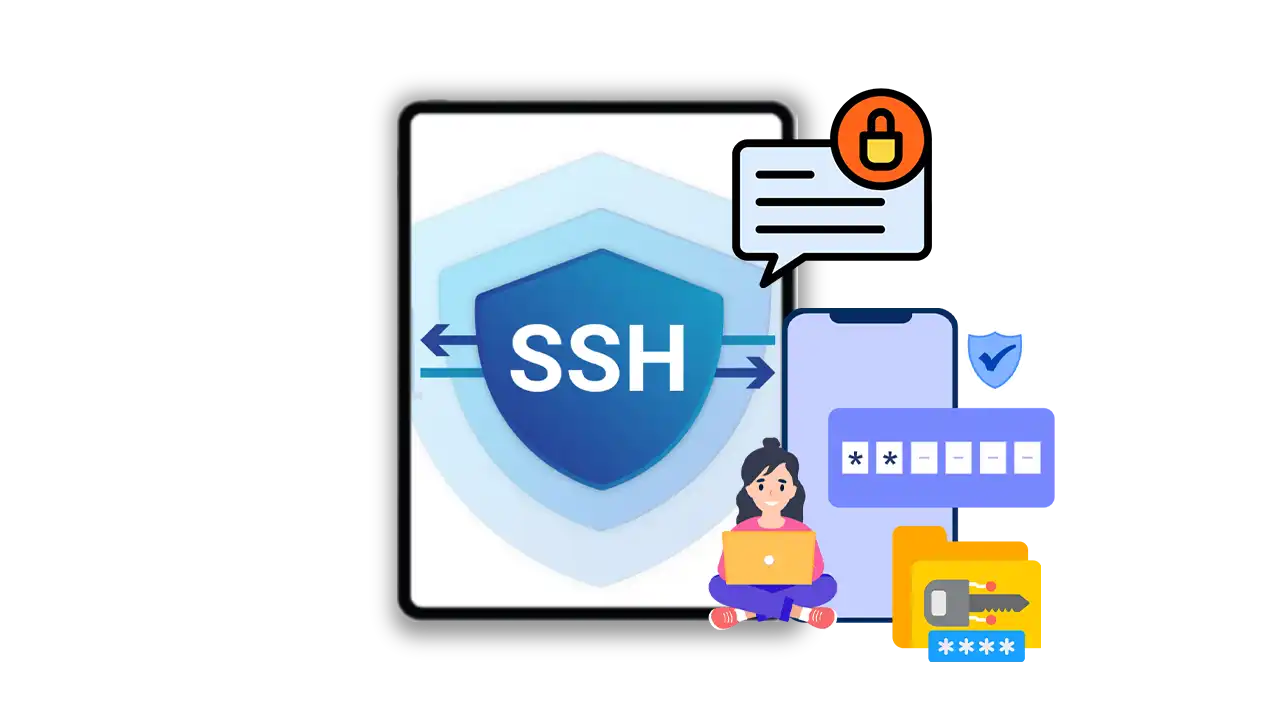
Authentication
It engages a powerful authentication method to verify the identity of the people who are communicating. It supports many authentication methods which include password-based authentication and public-key authentication methods.
Public-key authentication method involves the utilization of a pair of cryptographic keys like a public key and a private key. The public key is given to the server but the private key remains private with you.
Encryption
Once the authentication is successful then it creates an encrypted tunnel between you and the server. It uses very strong encryption algorithms like AES (Advanced Encryption Standard) in order to encrypt all data that is transmitted through that tunnel. This makes sures that even if someone attacks or interrupts the network traffic the attacker would not be able to decrypt the encrypted data.
Secure Communication
Now with the encrypted tunnel in place secure socket shells enables secure communication between you and the server. Now you can remotely login, execute commands and transfer files safely.
SSH Compatible VPNs And Protocols
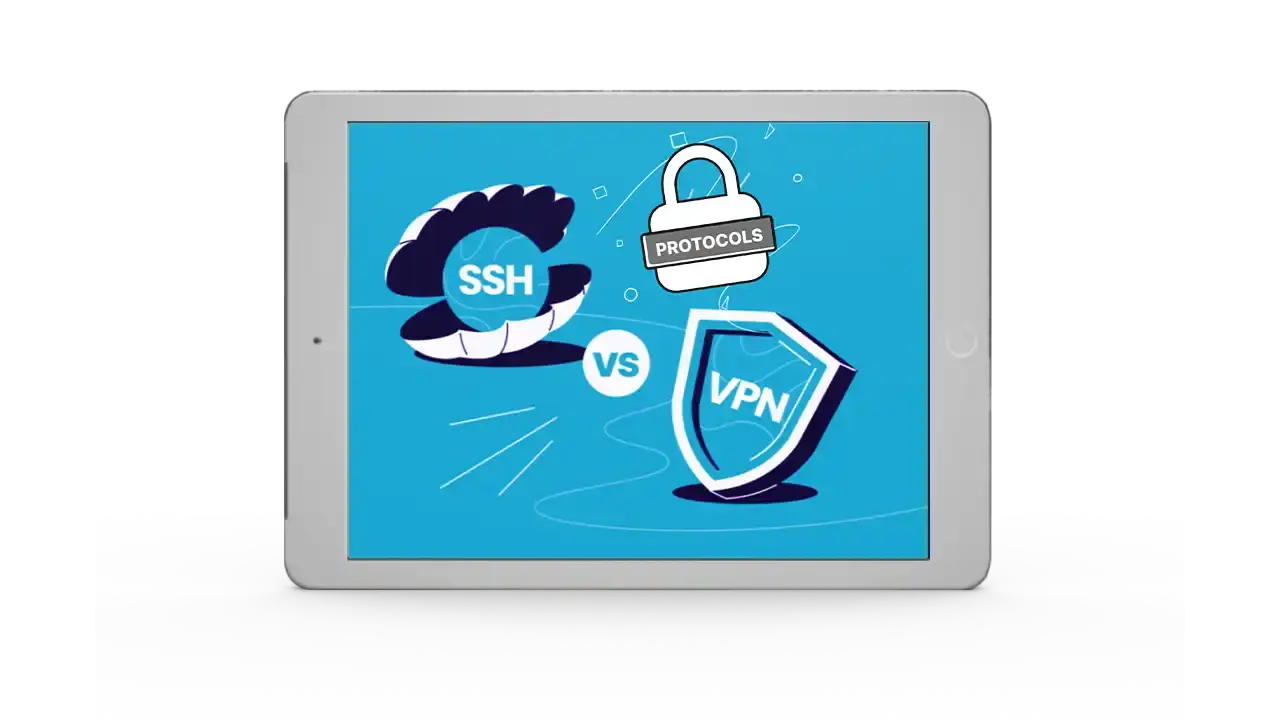
NordVPN
NordVPN is a very reliable provider that offers secure socket shell compatibility and advanced security features as well. It uses military-grade encryption and provides double VPN functionality for enhanced privacy.
OpenVPN
OpenVPN is a highly customizable open-source VPN. It supports SSH. It offers very strong encryption with multiple authentication methods and the ability to create secure tunnels. OpenVPN is widely used and can be configured to work on many platforms.
WireGuard
WireGuard is a highly advanced protocol that mainly focuses on simplicity, speed and security. It can be used in conjunction with secure socket shells so that an additional layer of encryption is provided to you.
SoftEther VPN
SoftEther is a multi-protocol VPN software that supports SSH, IPsec, SSTP, OpenVPN and L2TP protocols as well. It offers very advanced features like VPN cascading, dynamic DNS and NAT traversal. SoftEther is open-source and can be used for both personal and commercial purposes.
strongSwan
strongSwan is an open-source IPsec virtual private network that can be configured to work with SSH as well. It provides a large range of authentication techniques including public key authentication and X.509 certificates too. strongSwan is mainly known for its robustness, reliability and support for very advanced features.
Cisco AnyConnect
Cisco AnyConnect is a popular enterprise virtual private network client that offers secure socket shell compatibility as well. It provides secure remote access to large networks. AnyConnect supports various authentication methods which include multi-factor authentication and offers features like Network Access Manager and split tunneling.
ExpressVPN
ExpressVPN is a very user-friendly provider that supports SSH and also offers strong encryption. It has a very large network of servers across the globe and provides fast connection speeds.
ProtonVPN
ProtonVPN is a service that supports secure socket shells and it is focused on privacy. It offers a strict no-logging policy and advanced features like Secure Core servers and Tor over VPN. It has a user-friendly interface on its app and provides a free plan with limited features.
PureVPN
PureVPN is fitted with features that also offers secure socket shells compatibility. They have a vast range of security protocols. It provides features like split tunneling, ad-blocking and even DDoS protection. PureVPN also offers a no-log policy and 24/7 support to its users.
CyberGhost VPN
CyberGhost is also a user-friendly VPN service. It also supports SSH and gies strong encryption. It offers a large network of servers that are designed just for many purposes like streaming, torrenting and even gaming.
IPVanish
IPVanish is a secure and fast provider that offers compatibility with SSH protocol. It owns and operates its own server network which provides its users excellent speed and reliability. IPVanish offers strong features like automatic IP switching and DNS leak protection.
VyprVPN
VyprVPN is a service that is compatible with secure socket shells protocol. It also offers advanced features like VyprDNS and Chameleon protocol. It owns and manages its own server network, ensuring fast and secure connections.
TunnelBear
TunnelBear is one of a simple and user-friendly SSH compatible VPNs. It offers strong encryption and a very strict no-logging policy. TunnelBear also provides a free plan with very limited data but their paid plans offer unlimited data.
Private Internet Access (PIA)
Private Internet Access is also a SSH compatible VPN. It offers strong privacy features too. It has a large network of servers that provides very fast connection speed. PIA also offers solid encryption, a strict no-logging policy and fancy features like SOCKS5 proxy and port forwarding.
Windscribe
Windscribe is a service that offers SSH compatibility and a generous free plan with 10GB of monthly data. It provides strong encryption, a no-logging policy, and advanced features like ad-blocking and firewall. Windscribe has a user-friendly interface and offers unlimited simultaneous connections.
These are SSH compatible VPNs and protocols that also provide a vast range of features and benefits. They give secure remote access, strong encryption and various security protocols to protect your privacy and data.

Get Started w/ NordVPN Today
- Top-rated VPN for OS unknown
- Ultra-fast speed in 2025
- Save 69% off with VPN.com Discount
- Plans starting at $2.99/month
- Rated 4.5/5 on Google Play with over 825,000 reviews
- Rated 4.7/5 on Apple App Store from 6,600 users
How to Implement SSH in VPNs?
Choose SSH Compatible VPNs
Well obviously the first step of implementing secure socket shells protocol in a VPN is to select a virtual private network that supports SSH. There are many popular providers like NordVPN, OpenVPN, WireGuard and SoftEther VPN that are SSH compatible VPNs.
Set Up the VPN Server
Now once you have chosen your favorite SSH-compatible VPN your next step has to be to set up the virtual private network server. This step involves installing and configuring the VPN software on a virtual private server (VPS). The specific installation and configuration procedure is different depending on the provider you choose. For that you have to follow the documentation provided by your chosen provider.
Configure SSH on the VPN Server
Now after you set up the VPN server you need to configure secure socket shells on it. This usually involves the following steps:
- Install the SSH server software on the VPN server.
- Generate keys for authentication. Create a pair of SSH keys (a public key and a private key) for each user who will access the VPN via SSH.
- Configure the secure socket shells server settings. Modify the server configuration file like the SSH port number, authentication methods and security options.
Configure SSH on the VPN Client
Now to access the VPN using SSH you need to configure SSH on the VPN user as well. For that you need to first install software on the user’s device. Their popular options are OpenSSH for both Windows and Linux and PuTTY for Windows. Now you must secure the secure socket shells private key corresponding to the public key that is used on the VPN server. And the private key should be securely stored on the user’s device.
Now you must configure the SSH users to connect to the VPN server by using the proper SSH settings like the server’s IP address or hostname, SSH port number and the path to the private key file.
Establish the SSH-Secure VPN Connection
And now with both the virtual private network server and user configured for SSH protocol you can establish the SSH-secure VPN connection. To do this you should first start the VPN user’s software and begin the virtual private network connection to the VPN server. Then give the passwords for authentication like SSH private key. After that, the VPN connection will be established, and all of the data that is transmitted between you and the server will be encrypted using secure socket shells.
What Are The Benefits Of Using SSH in VPNs?
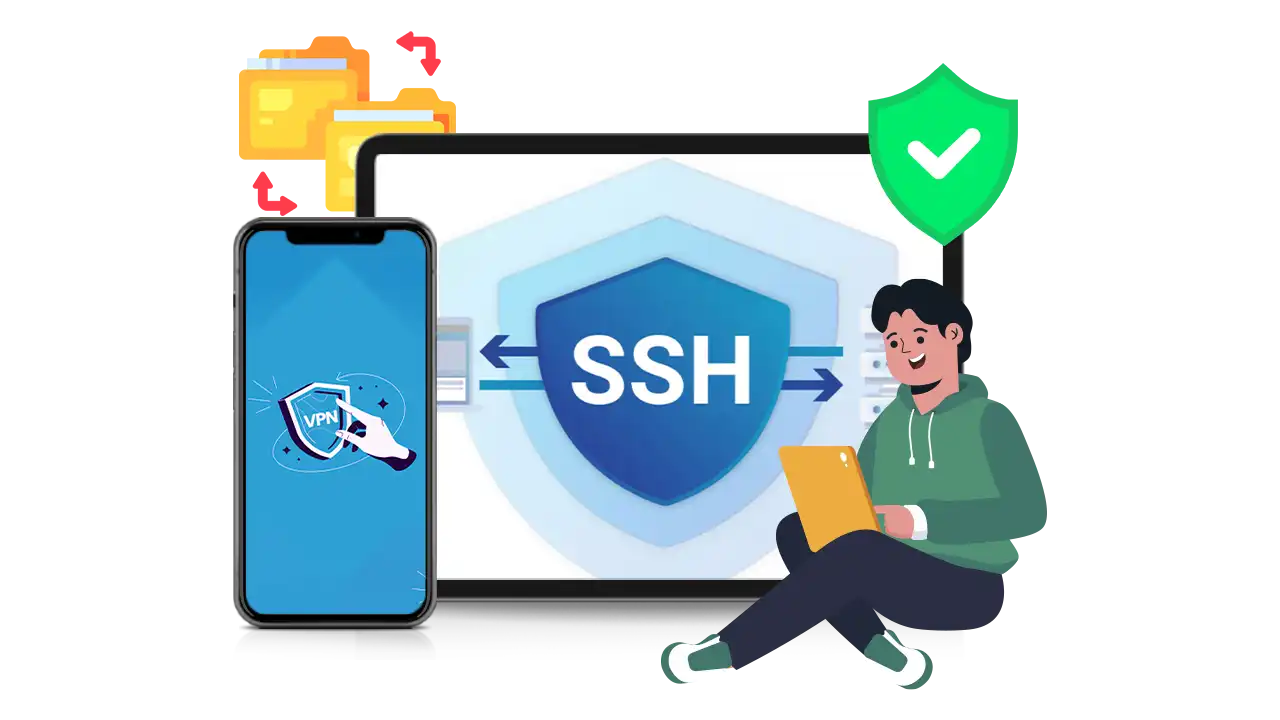
Well yes there are some benefits of using SSH in VPNs. And those are discussed here below.
Improved Security
As mentioned before secure socket shells provides very solid encryption and secure authentication procedures. And by implementing SSH virtual private networks can ensure that your data sent over that network will remain private and protected from all of those who are not authorized to access. The use of such strong encryption algorithms like AES makes it almost impossible for cybercriminals to snatch and decode the encrypted traffic.
Reduced Attack Surface
SSH compatible VPNs have a much smaller attack surface as compared to other protocols. Secure socket shells are well-developed and evolved protocol that has gone through extensive security improvements over the years. This means that SSH compatible VPNs are immune to known threats and exploits which automatically reduces the risk of security breaches.
Secure File Transfer
They follow a secure file transfer protocol just like SFTP (SSH File Transfer Protocol) and SCP (Secure Copy Protocol). These protocols also enable the secure transfer of files between you and the server to ensure that the data is kept private. It also encrypts the file contents and protects them from any unauthorized access during its transfer.
Tunneling and Port Forwarding
It allows the creation of encrypted tunnels, enabling secure access to network services and applications too. You can securely access any database or internal web applications remotely through SSH tunneling just by forwarding network traffic through the encrypted connection.
Cross-Platform Compatibility
It is a widely supported protocol that is available on many platforms, including Linux, macOS, Windows and mobile devices also. This cross-platform compatibility makes sure that users can securely access and manage their systems regardless of the operating system they are using.
Simplified Firewall Configuration
SSH traffic is commonly allowed through firewalls because it is widely used for legitimate purposes like remote server management. This simplifies the firewall configuration process for SSH VPNs. Why you ask? Because usually there is no need to open an additional port or to create complex firewall rules.
Seamless Remote Access
SSH compatible VPNs enable consistent and secure remote access to business networks and resources. Employees can access the virtual private network from anywhere they want using any device that supports secure socket shells. This flexibility is very valuable in today’s remote work environment.
Cost-Effectiveness
Implementing SSH compatible VPNs can be very cost-effective as compared to other virtual private networks. It is an open-source protocol which means that there are many free and low-cost SSH implementations available for you. Also many operating systems come with built-in SSH protocol which then reduces the need for an additional software purchase.
The Future Of SSH in VPNs
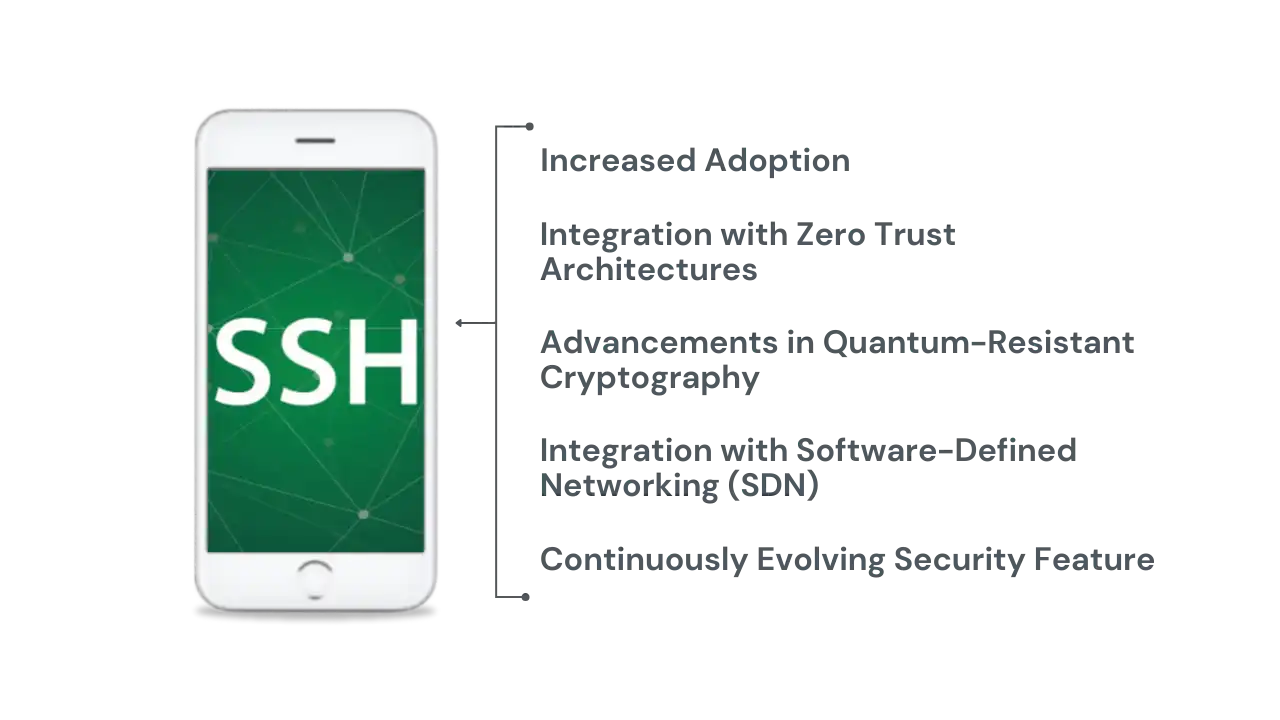
Now as we look towards 2025 and beyond that the future of SSH in VPNs appears very promising. Let us tell you some key trends and developments that are taking place and are likely to shape the landscape:
Increased Adoption
With the growing significance of cybersecurity and data privacy it is expected to operate the adoption of SSH compatible VPNs. Because many organizations have become more aware of the benefits that are offered by secure socket shells like enhanced security and firewall compatibility. The demand for these virtual private networks is very likely to boost.
Integration with Zero Trust Architectures
Zero Trust is an emerging security model that assumes no one should be trusted and it continuously verifies every access that is requested. SSH compatible VPNs can play a crucial role in the implementing Zero Trust architecture. By using SSH’s strong authentication and encryption ability virtual private networks can ensure that only authorized users and devices can access network resources.
Advancements in Quantum-Resistant Cryptography
As quantum computing also advances towards the future there are many concerns about the potential vulnerability of current encryption algorithms to quantum attacks. In response to this researchers are also developing quantum-resistant cryptography techniques. As SSH compatible VPNs are positioned well to adopt these new algorithms which ensure long-term security against these quantum threats.
Integration with Software-Defined Networking (SDN)
Software-defined networking (SDN) is network management software that makes controlling and programming easy for us. SSH compatible VPNs can be consistently integrated into the SDN environment. It enables dynamic and scalable virtual private network usage.
Continuously Evolving Security Features
As cybersecurity threats are continuing to evolve. Same as SSH compatible VPNs will need to adapt and contain new security features. This may include enhancing multi-factor authentication procedures, integration with security information and event management (SIEM) systems and advanced threat detection capabilities.

Get Started w/ NordVPN Today
- Top-rated VPN for OS unknown
- Ultra-fast speed in 2025
- Save 69% off with VPN.com Discount
- Plans starting at $2.99/month
- Rated 4.5/5 on Google Play with over 825,000 reviews
- Rated 4.7/5 on Apple App Store from 6,600 users
Frequently Asked Questions
What is an SSH compatible VPN?
An SSH compatible VPN is a Virtual Private Network that utilizes the Secure Shell (SSH) protocol for establishing secure and encrypted connections between devices over the internet.
Why are more VPNs using SSH?
More VPNs are adopting SSH due to its strong security features, firewall compatibility, and versatility. SSH provides robust encryption, secure key-based authentication, and the ability to bypass network restrictions, making it an attractive choice for VPN implementations.
How does SSH enhance VPN security?
SSH enhances VPN security by employing advanced encryption algorithms, such as AES, to protect data during transmission. It also supports secure key-based authentication, reducing the risk of unauthorized access. Additionally, SSH has a smaller attack surface compared to other VPN protocols, making it less susceptible to known vulnerabilities.
Can SSH VPNs work with different operating systems?
Yes, SSH compatible VPNs offer cross-platform compatibility and can be set up on various platforms, including Linux, Windows, macOS and mobile devices. This ensures that users can securely access their VPN from any device, regardless of the operating system.
How do I implement SSL in an SSH compatible VPN?
To implement SSL in an SSH compatible VPN, you need to generate an SSL certificate, configure it on the VPN server, enable SSL encryption for VPN connections, configure clients properly, and thoroughly test and validate the VPN connection to ensure secure communication.
What are the benefits of using SSH in VPNs?
The benefits of using SSH in VPNs include improved security through robust encryption and authentication, reduced attack surface, simplified firewall configuration, seamless remote access, and cost-effectiveness compared to other VPN solutions.
Is SSH compatible with Zero Trust architectures?
Yes, SSH compatible VPNs can play a crucial role in implementing Zero Trust architectures. By leveraging SSH’s strong authentication and encryption capabilities, VPNs can ensure that only authorized users and devices can access network resources, aligning with the Zero Trust principles.
How can SSH VPNs adapt to emerging cybersecurity threats?
SSH compatible VPNs can adapt to emerging cybersecurity threats by incorporating new security features, such as enhanced multi-factor authentication, integration with security information and event management (SIEM) systems, and advanced threat detection capabilities. By staying at the forefront of security innovations, SSH VPNs can provide robust protection against evolving threats.
What is the future outlook for SSH in VPNs?
The future outlook for SSH in VPNs is promising. With the growing emphasis on cybersecurity and data privacy, the adoption of SSH compatible VPNs is expected to rise significantly. Advancements in quantum-resistant cryptography, integration with Software-Defined Networking (SDN), and the continuous evolution of security features will shape the future of SSH in VPNs.
How can organizations stay informed about SSH VPN technology?
Organizations can stay informed about SSH VPN technology by regularly following industry blogs, attending cybersecurity conferences, participating in online forums, and engaging with VPN service providers. Staying up-to-date with the latest developments and best practices in SSH VPN technology allows organizations to make informed decisions and proactively fortify their cybersecurity defenses.
The Bottom Line
Now we have covered a lot of ground in this guide from understanding the fundamentals of SSH and virtual private networks to exploring the top SSH compatible VPNs in the market. It is quite clear that implementing SSH in VPNs offers best of benefits including enhanced security, reduced attack surface, secure file transfer and seamless remote access as well. And as we look towards the future the adoption of these virtual private networks is set to rise above.
But remember, choosing the right one is the first and most important step. It is equally necessary to stay informed about the latest growth and best applications in secure socket shells VPN technology, by doing that you can ensure that you are always one step ahead of the game.
So whether you are a user who is looking to secure your online activities or an organization that is aiming to protect your cybersecurity defenses, SSH compatible VPNs are a powerful tool to have in your inventory. With their solid encryption methods, secure authentication and cross-platform compatibility these virtual private networks offer an almost complete solution for protecting your digital data. So go ahead and embrace the power of SSH compatible VPNs and surf the web with confidence and peace of mind. Happy, secure browsing.
Customer Reviews for NordVPN Review 2025: Speed, Security & Real-World Tests
Connection issues with MLB.TV
May, 2 2023
Prompt customer service
May, 6 2023
I would highly recommend
December, 15 2023
Sorry we've not compiled any data on VPNs that offer SSH Compatible VPNs: Boost Your Online Security In 2025
